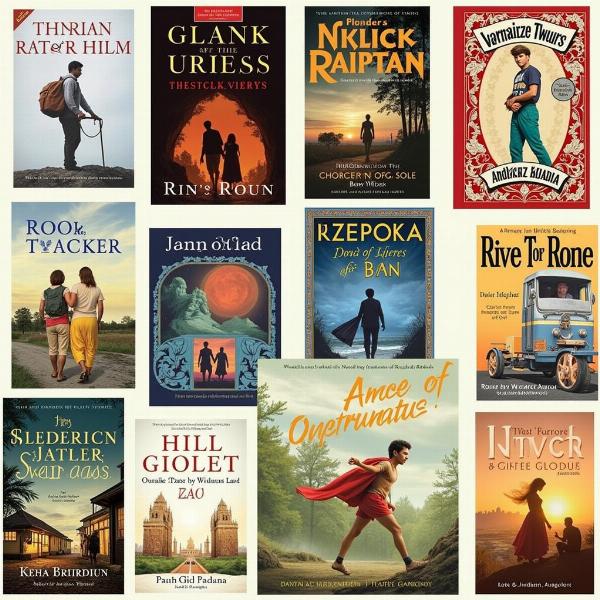Understanding the meaning of “wayfarer” in Hindi enriches our appreciation of both languages and cultures. This guide will explore the various Hindi translations, their nuances, and their cultural context, providing a complete understanding of “wayfarer meaning in Hindi”.
Decoding “Wayfarer” in Hindi
“Wayfarer” essentially refers to a traveler, particularly one traveling on foot. The Hindi language offers several beautiful and evocative translations that capture the essence of this word. The most common translations include yātrī (यात्री), pathik (पथिक), and musāfir (मुसाफ़िर). Each word carries its own subtle shades of meaning, adding depth and richness to the concept of a traveler.
Exploring the Nuances: Yatri, Pathik, and Musafir
While all three words translate to “traveler,” they differ in their connotations. Yātrī often implies a pilgrim on a religious journey. Pathik, on the other hand, suggests someone traveling on a path, often through nature. Finally, musāfir evokes a sense of wanderlust and adventure, suggesting a traveler who is far from home. Choosing the right word depends on the specific context and the desired nuance.
The Spiritual Traveler: Yatri
Yātrī carries a spiritual connotation, often associated with pilgrimage and religious devotion. Imagine a yātrī undertaking the arduous journey to the Himalayas, seeking enlightenment or spiritual fulfillment. This word beautifully captures the sacred aspect of travel.
The Path-Taker: Pathik
Pathik emphasizes the journey itself, the act of traversing a path. Picture a pathik strolling along a dusty road, enjoying the simplicity of nature and the freedom of the open road. This word focuses on the physical act of traveling and the connection with the surrounding environment.
The Wanderer: Musafir
Musāfir carries a sense of adventure and exploration, often implying a journey far from home. Think of a musāfir exploring exotic lands, embracing new cultures and experiences. This word encapsulates the spirit of discovery and the thrill of the unknown.
Cultural Context of the Wayfarer
The concept of the wayfarer is deeply ingrained in Indian culture and literature. From ancient epics like the Ramayana and Mahabharata to modern poetry and films, the traveler’s journey often symbolizes the search for meaning, self-discovery, and spiritual growth.
Wayfarers in Indian Literature
Indian literature abounds with stories of wayfarers, each embarking on a unique journey. These stories often explore themes of perseverance, resilience, and the transformative power of travel.
 Wayfarers in Indian Literature
Wayfarers in Indian Literature
Why Understanding “Wayfarer Meaning in Hindi” Matters
Understanding the different nuances of “wayfarer” in Hindi allows for a deeper appreciation of Indian culture and literature. It enables us to connect with the rich tapestry of stories and traditions that celebrate the journey, both physical and spiritual.
Conclusion
From the spiritual yātrī to the adventurous musāfir, the Hindi language offers a beautiful array of words to describe the wayfarer. By understanding these nuances, we gain a deeper insight into the cultural significance of travel in India. So, the next time you encounter the word “wayfarer,” consider its various Hindi translations and the rich tapestry of meaning they evoke.
FAQ
- What is the most common Hindi word for “wayfarer”? Yātrī is probably the most frequently used term, although pathik and musāfir are also common.
- Does “wayfarer” always imply travel on foot? While it often suggests walking, “wayfarer” can also refer to someone traveling by other means.
- Which Hindi word should I use to describe a pilgrim? Yātrī is the most appropriate term for a pilgrim.
- What is the difference between pathik and musāfir? Pathik emphasizes the journey itself, while musāfir suggests a sense of adventure and exploration.
- Why is the concept of the wayfarer important in Indian culture? The wayfarer’s journey often symbolizes the search for meaning and spiritual growth in Indian culture.
- Where can I find more examples of wayfarers in Indian literature? The Ramayana, Mahabharata, and numerous other works of Indian literature feature stories of wayfarers.
- Is there a specific gender associated with the term “wayfarer”? No, “wayfarer” is a gender-neutral term.
Meaning-Hindi.in offers expert translation services in various domains, including business, legal, technical, website localization, educational, and specialized fields. Our team of experienced translators ensures accurate and culturally sensitive translations, bridging the language gap for individuals and businesses alike. Contact us at [email protected] or call us at +91 11-4502-7584. Meaning-Hindi.in is your trusted partner for all your Hindi translation needs.